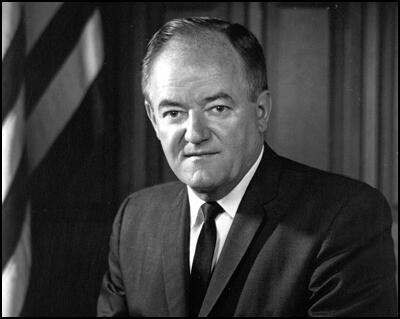Hubert Humphrey
Hubert Humphrey, the son of pharmacist, was born in Wallace, South Dakota on 27th May, 1911. Educated at the University of Minnesota, Humphrey was forced to abandon his studies when his father's business collapsed in 1932. After helping his father to resurrect the family business Humphrey returned to university and finally graduated in 1939.
Humphrey was an active member of the Democratic Party and worked as campaign manager for Franklin D. Roosevelt in Minnesota during the 1944 presidential election. The following year Humphrey was elected mayor of Minneapolis.
A strong supporter of civil rights, Humphrey became a leading member of the American Democratic Action pressure group. In the 1948 Democtatic National Convention in 1948, Humphrey supported Harry S. Truman and his Fair Deal proposals included legislation on civil rights, fair employment practices and opposition to lynching. When Truman won the Democratic Party nomination, Southern Democrats formed the States' Rights Democratic Party (Dixiecrats) and Storm Thurmond was chosen as its presidential candidate.
Humphrey was elected to the Senate in 1948. Over the next fifteen years Humphrey was closely association with many progressive causes including the formation of a Peace Corps, the creation of a Food for Peace program and legislation favoring trade unions, African Americans and the unemployed.
During the period known as McCarthyism (1950-1954) members of the Republican Party and conservative members of the Democratic Party, accused Humphrey of being "soft on Communism". However, Humphrey had always fought Communist Party influence in progressive organizations such as the American Democtatic Action.

Humphrey was defeated by John F. Kennedy in his attempt to become the Democratic Party's presidential candidate in 1960. He also failed in 1964, but the victor, Lyndon Baines Johnson selected him as his vice president and was able to influence the decision introduce the Voting Rights Act (1965) and the Immigration Act (1965) acts.
In 1968 Humphrey was chosen as the party's presidential candidate against Richard Nixon of the Republican Party. With progressive forces in the country unhappy with Humphrey's support of the Vietnam War, and with George Wallace collecting over 9 million votes in the South, it was no surprise when he failed to win the election. Nixon won 31,770,237 votes against 31,270,533 for Humphrey.
After working as professor of public affairs at the University of Minnesota for two years, Humphrey was once again elected to the Senate in 1970. Hubert Humphrey died of cancer on 13th January, 1978.
Primary Sources
(1) Hubert Humphrey, speech at a meeting of the National Alliance of Businessmen at Long Island the day after the assassination of Martin Luther King (5th April, 1968)
Last night, Dr. Martin Luther King, Jr., died a martyr's death. His death snatched from American life something rare and precious, the living reminder that one man can make a difference - that one man, by the force of his character, the depth of his convictions, and the eloquence of his voice - can alter the course of history. What a testimonial to individualism, what a testimonial to dignity and to human purpose - for Martin Luther King had the courage to challenge the intolerance, the injustice, inadequacies and inequities of the society in which he lived - a nation that he loved - a nation of which he was a citizen - and a nation for which he prayed and worked.

